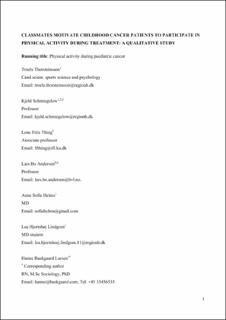| dc.contributor.author | Thorsteinsson, Troels | |
| dc.contributor.author | Schmiegelow, Kjeld | |
| dc.contributor.author | Thing, Lone Friis | |
| dc.contributor.author | Andersen, Lars Bo | |
| dc.contributor.author | Helms, Anne Sofie | |
| dc.contributor.author | Ingersgaard, Marianne Vie | |
| dc.contributor.author | Lindgren, Lea Hjortshøj | |
| dc.contributor.author | Larsen, Hanne Bækgaard | |
| dc.date.accessioned | 2020-08-05T11:19:39Z | |
| dc.date.available | 2020-08-05T11:19:39Z | |
| dc.date.created | 2019-08-22T15:04:41Z | |
| dc.date.issued | 2019 | |
| dc.identifier.citation | Thorsteinsson, T., Schmiegelow, K., Thing, L. F., Andersen, L. B., Helms, A. S., Ingersgaard, M. V., … Larsen, H. B. (2019). Classmates motivate childhood cancer patients to participate in physical activity during treatment: A qualitative study. European Journal of Cancer Care, 28(5). | en_US |
| dc.identifier.issn | 0961-5423 | |
| dc.identifier.uri | https://hdl.handle.net/11250/2670942 | |
| dc.description | This is the peer reviewed version of the following article: Thorsteinsson, T., Schmiegelow, K., Thing, L. F., Andersen, L. B., Helms, A. S., Ingersgaard, M. V., … Larsen, H. B. (2019). Classmates motivate childhood cancer patients to participate in physical activity during treatment: A qualitative study. European Journal of Cancer Care, 28(5), which has been published in final form at https://onlinelibrary.wiley.com/doi/full/10.1111/ecc.13121. This article may be used for non-commercial purposes in accordance with Wiley Terms and Conditions for Use of Self-Archived Versions. | en_US |
| dc.description.abstract | Introduction Children with cancer experience reduced physical fitness and compromised social relationships during and following intensive treatment. This may negatively impact their quality of life. As part of the RESPECT study, we explored the motivations for participation in a physical activity programme during treatment. Methods Thirteen semi‐structured interviews were conducted with seven boys and six girls, diagnosed with paediatric cancer in 2013 and treated with chemotherapy (age 8–16 years; time from diagnosis to interview 6–16 months). Interviews were conducted in the children's homes. Results The qualitative analysis showed that children's motivations for engaging in the physical activity programme during intensive medical treatment were primarily influenced by (a) opportunity for physical activity with a classmate; (b) participation in group physical activity sessions; (c) support from significant others; and (d) improvement of physical well‐being. Main barriers included (a) poor physical well‐being; (b) compliance with medical procedures and being treated in protective isolation; and (c) limited physical activity facilities. Conclusion Despite barriers, it is possible to motivate and engage children with cancer in physical activity during intensive treatment in a paediatric oncology ward. Physical exercise and activity should be recommended and promoted from diagnosis throughout the treatment period and should include psychosocial and professional support. | en_US |
| dc.language.iso | eng | en_US |
| dc.publisher | Wiley | en_US |
| dc.subject | cancer | en_US |
| dc.subject | exercise | en_US |
| dc.subject | intervention | en_US |
| dc.subject | motivation | en_US |
| dc.subject | paediatric oncology | en_US |
| dc.subject | rehabilitation | en_US |
| dc.title | Classmates motivate childhood cancer patients to participate in physical activity during treatment: A qualitative study | en_US |
| dc.type | Peer reviewed | en_US |
| dc.type | Journal article | en_US |
| dc.description.version | acceptedVersion | en_US |
| dc.source.pagenumber | 1-10 | en_US |
| dc.source.volume | 28 | en_US |
| dc.source.journal | European Journal of Cancer Care | en_US |
| dc.source.issue | 5 | en_US |
| dc.identifier.doi | 10.1111/ecc.13121 | |
| dc.identifier.cristin | 1718095 | |
| cristin.ispublished | true | |
| cristin.fulltext | postprint | |
| cristin.qualitycode | 1 | |
